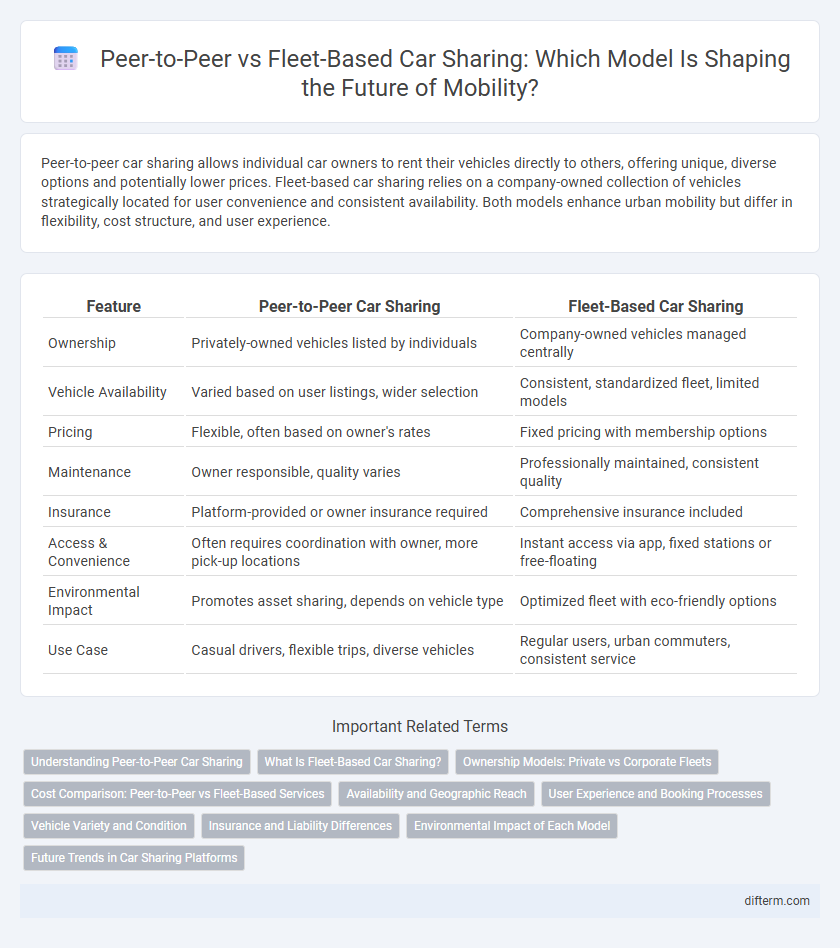Peer-to-peer car sharing allows individual car owners to rent their vehicles directly to others, offering unique, diverse options and potentially lower prices. Fleet-based car sharing relies on a company-owned collection of vehicles strategically located for user convenience and consistent availability. Both models enhance urban mobility but differ in flexibility, cost structure, and user experience.
Table of Comparison
| Feature | Peer-to-Peer Car Sharing | Fleet-Based Car Sharing |
|---|---|---|
| Ownership | Privately-owned vehicles listed by individuals | Company-owned vehicles managed centrally |
| Vehicle Availability | Varied based on user listings, wider selection | Consistent, standardized fleet, limited models |
| Pricing | Flexible, often based on owner's rates | Fixed pricing with membership options |
| Maintenance | Owner responsible, quality varies | Professionally maintained, consistent quality |
| Insurance | Platform-provided or owner insurance required | Comprehensive insurance included |
| Access & Convenience | Often requires coordination with owner, more pick-up locations | Instant access via app, fixed stations or free-floating |
| Environmental Impact | Promotes asset sharing, depends on vehicle type | Optimized fleet with eco-friendly options |
| Use Case | Casual drivers, flexible trips, diverse vehicles | Regular users, urban commuters, consistent service |
Understanding Peer-to-Peer Car Sharing
Peer-to-peer car sharing leverages privately owned vehicles, enabling car owners to rent out their cars directly to other users via digital platforms, which increases vehicle utilization and reduces overall costs. This model contrasts with fleet-based car sharing, where companies manage a dedicated set of vehicles that users rent short-term, often requiring centralized parking and higher operational expenses. Understanding peer-to-peer car sharing highlights its potential to expand mobility options, optimize asset use, and provide more flexible, localized access compared to traditional fleet systems.
What Is Fleet-Based Car Sharing?
Fleet-based car sharing involves a centralized system where a company or organization owns, manages, and maintains a pool of vehicles available for rent by multiple users. This model ensures consistent vehicle availability, standardized maintenance, and professional oversight, making it suitable for urban areas with high demand. Fleet-based car sharing platforms often integrate advanced telematics and reservation systems to optimize utilization and reduce operational costs.
Ownership Models: Private vs Corporate Fleets
Peer-to-peer car sharing relies on private vehicle ownership, allowing individual car owners to rent out their personal vehicles, fostering decentralized access and reducing idle time. Fleet-based car sharing operates through corporate or municipal fleets, which are professionally managed and maintained to ensure consistent vehicle availability and standardized user experience. The ownership model directly impacts operational efficiency, user trust, and scalability within urban mobility ecosystems.
Cost Comparison: Peer-to-Peer vs Fleet-Based Services
Peer-to-peer car sharing typically offers lower costs due to the absence of fleet maintenance and overhead expenses, allowing vehicle owners to set competitive rental prices. Fleet-based car sharing involves substantial investments in vehicle acquisition, maintenance, insurance, and staffing, resulting in higher operational costs reflected in user fees. Cost efficiency in peer-to-peer models appeals to budget-conscious users, while fleet-based services provide consistent availability and quality control despite higher prices.
Availability and Geographic Reach
Peer-to-peer car sharing offers greater geographic reach by utilizing privately owned vehicles dispersed across diverse neighborhoods, enhancing availability in suburban and less densely populated areas. Fleet-based car sharing primarily operates within high-demand urban centers, concentrating vehicles in designated hotspots which can limit accessibility outside core zones. This decentralized model of peer-to-peer sharing increases vehicle access points and provides flexible options beyond the fixed locations of fleet-based services.
User Experience and Booking Processes
Peer-to-peer car sharing offers users a personalized experience with diverse vehicle options and flexible pick-up locations, enhancing convenience and community interaction. Fleet-based car sharing provides standardized vehicles and streamlined booking through centralized platforms, ensuring consistent availability and simplified reservation steps. Booking processes for peer-to-peer models may require more communication and verification, while fleet-based systems utilize automated scheduling and instant confirmations for faster user transactions.
Vehicle Variety and Condition
Peer-to-peer car sharing offers a diverse range of vehicle options, reflecting the personal preferences of individual car owners, which often includes unique or niche models not typically found in fleet-based services. Fleet-based car sharing maintains a standardized selection of well-maintained, newer vehicles, ensuring consistent reliability and predictable performance. Vehicle condition in fleet-based sharing generally meets strict maintenance schedules, whereas peer-to-peer cars may vary significantly in upkeep and cleanliness.
Insurance and Liability Differences
Peer-to-peer car sharing often involves individual vehicle owners, leading to insurance policies that require specialized coverage or rider policies to bridge gaps between personal auto insurance and commercial use. Fleet-based car sharing providers typically maintain centralized insurance plans covering their entire vehicle inventory, simplifying liability management and offering more consistent protection. Liability in peer-to-peer models can be more complex due to varying owner policies and potential disputes, whereas fleet-based services generally streamline claims handling through uniform corporate insurance agreements.
Environmental Impact of Each Model
Peer-to-peer car sharing reduces environmental impact by maximizing the use of privately owned vehicles, decreasing the need for additional fleet production and minimizing idle vehicle time. Fleet-based car sharing centralizes vehicle maintenance and optimizes cleaner, electric vehicle integration, resulting in lower emissions per trip but higher resource consumption for fleet management. Studies show that peer-to-peer models contribute to reduced vehicle miles traveled (VMT) and carbon footprint when effectively coordinated, while fleet-based models excel in controlled emission standards and urban air quality improvements.
Future Trends in Car Sharing Platforms
Peer-to-peer car sharing platforms leverage decentralized vehicle access, enabling private car owners to rent out their vehicles directly to users, fostering localized mobility solutions and reducing idle vehicle time. Fleet-based car sharing relies on operator-owned vehicles maintained in strategic urban locations, offering standardized services with real-time availability through advanced telematics and AI-driven demand forecasting. Future trends indicate hybrid models combining both approaches, integrated with electric and autonomous vehicles, enhancing flexibility, sustainability, and seamless user experiences in smart city ecosystems.
peer-to-peer car sharing vs fleet-based car sharing Infographic

 difterm.com
difterm.com